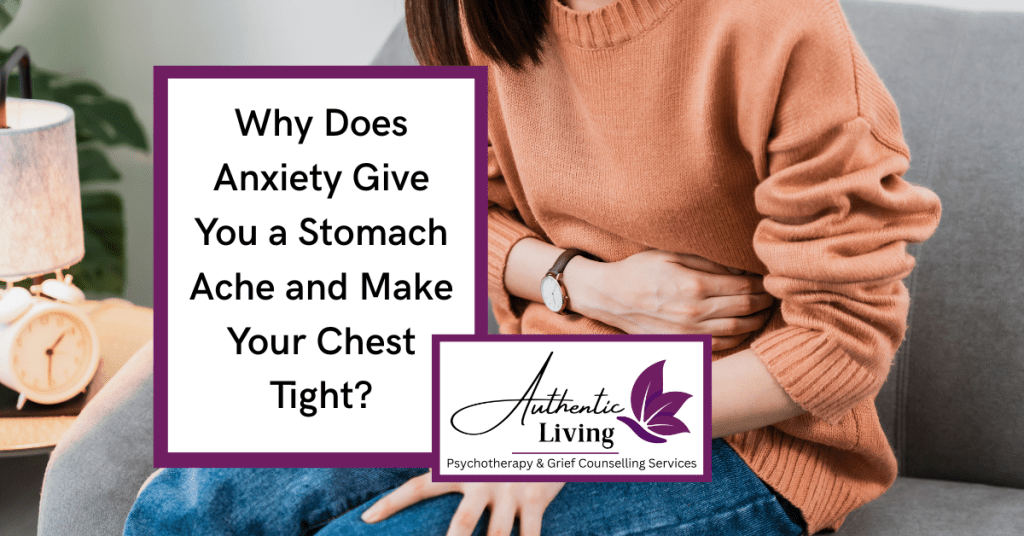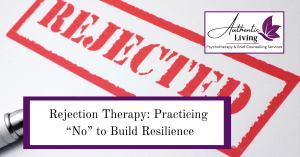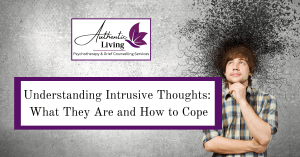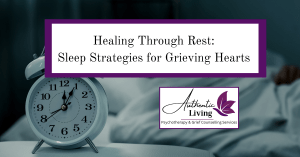Anxiety doesn’t just live in your mind—it shows up in your body, too. If you’ve ever felt a stomach ache or chest tightness during a stressful moment, you’re not imagining it. These physical symptoms are real, and they’re your body’s natural response to stress.
In this blog, we’ll explain the science behind why anxiety affects your stomach and chest, what it means, and how therapy can help you feel better.
What Is Anxiety?
Anxiety is a biological survival response that gets triggered when your brain senses danger or stress. Even if there is no real threat, your brain may still respond as if there is. This reaction is controlled by your autonomic nervous system, especially the sympathetic nervous system, which prepares your body to “fight, flee, or freeze.”
When this happens, your body releases stress hormones like adrenaline and cortisol. These chemicals prepare your body to act fast—but they also cause a variety of physical symptoms, including changes in your digestion and breathing.
Why Does Anxiety Cause Stomach Aches?
1. The Gut-Brain Connection
Your stomach and intestines are deeply connected to your brain through a network called the enteric nervous system (sometimes referred to as the “second brain”). This system communicates directly with your central nervous system via the vagus nerve, one of the longest nerves in your body.
When you’re anxious, your brain sends distress signals to your gut. At the same time, digestion slows down or stops altogether, because your body is prioritizing survival over food processing.
2. Changes in Digestion
During the stress response:
Blood flow is redirected away from the digestive organs and toward your heart and muscles.
Your stomach may produce more acid, which can lead to symptoms like indigestion or nausea.
The muscles in your digestive tract may become more tense or spastic, leading to cramps or a “knot in your stomach” feeling.
You may experience changes in your bowel movements, such as diarrhea or constipation.
This is why anxiety often causes:
Stomach pain or cramping
Bloating and gas
Nausea
Acid reflux or indigestion
Loss of appetite
Urge to go to the bathroom more often
3. Heightened Body Awareness
Anxiety also increases your sensitivity to physical sensations. You may become more aware of normal gut activity and interpret it as painful or problematic. This hyper-awareness is sometimes called visceral hypersensitivity and is especially common in people with anxiety or IBS (irritable bowel syndrome).
Why Does Anxiety Make Your Chest Tight?
1. Changes in Breathing Patterns
One of the first things that happens when you’re anxious is your breathing becomes:
Faster (hyperventilation)
Shallower (you breathe more from the chest than the belly)
This change in breathing helps your body take in more oxygen in case you need to fight or run. But hyperventilation can cause:
Tightness or discomfort in the chest
Shortness of breath
Dizziness or light-headedness
Tingling in the hands or face
When you breathe quickly and shallowly, you disrupt the balance of oxygen and carbon dioxide in your blood, which can lead to chest symptoms that feel alarming, even if they are not dangerous.
2. Muscle Tension
Anxiety causes involuntary muscle tightening, especially in the neck, shoulders, upper back, and chest. This is your body’s way of bracing for impact. Over time, this tension can feel like:
A tight band wrapped around your chest
Pressure or weight on your ribcage
Pain or discomfort that worsens when you breathe deeply
Some people describe it as feeling like they can’t take a full breath, even though their oxygen levels are normal. This sensation is often called air hunger or dyspnea, and it can add to the feeling of panic.
3. Increased Heart Activity
Anxiety also increases heart rate and blood pressure. This can lead to:
A pounding or racing heart
Awareness of your heartbeat (palpitations)
Mild chest pain due to increased heart muscle activity
It’s important to note that chest tightness from anxiety is not dangerous, but it can feel very similar to symptoms of a heart attack, which is why it’s important to seek medical care if you’re ever unsure.
How to Tell the Difference Between Anxiety and a Medical Emergency
Chest pain and stomach issues can have many causes. See a doctor if your chest pain:
Comes on suddenly and feels crushing or sharp
Radiates to your arm, jaw, or back
Happens with fainting, sweating, or confusion
Similarly, seek medical advice if stomach pain is severe, long-lasting, or involves vomiting or bleeding. While anxiety can explain many symptoms, it’s always best to rule out physical health issues first.
How to Ease Anxiety-Related Body Symptoms
Anxiety often shows up in the body—and there are gentle ways to ease it. Deep belly breathing, light movement, and grounding exercises like the 5-4-3-2-1 technique can help you feel more present and calm. Staying nourished and hydrated also supports your body’s ability to regulate stress. And when it feels like too much to manage alone, therapy can help.
- Breathing Techniques
- Movement
- Grounding Exercises
- Eat and Hydrate
- Therapy
Therapy Can Help: Work with Lizanne Hills
Lizanne Hills is a registered therapist at Authentic Living London who specializes in helping people understand and manage anxiety. She offers a compassionate, non-judgmental space where you can explore:
What triggers your anxiety
How it shows up in your body
Techniques to regulate your nervous system
Tools to manage symptoms like stomach aches and chest tightness
Lizanne works with both teens and adults, and she understands that anxiety is not “just in your head”—it’s a full-body experience. Whether you’re feeling overwhelmed, physically unwell, or both, Lizanne can help you make sense of what you’re going through and find relief.
Sessions are available in-person in London, Ontario, or online across Ontario.
Take the First Step Toward Relief
If your anxiety is affecting your body, your focus, or your everyday life, it’s time to reach out. You deserve to feel better, and help is available.

Lizanne Hills
Registered Psychotherapist -Qualifying Addictions Certificate
Areas of Focus: Grief, Addictions, Family Therapy, Couples Therapy, Trauma/PTSD, Children’s Grief, Autism Spectrum Disorder, Life Transitions





